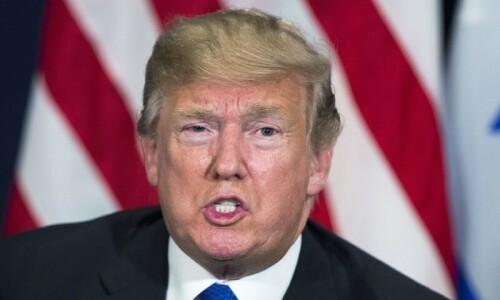A NEW wave of terrorism has been unleashed in the country. While the attacks are mostly aimed at our border regions by religiously motivated terrorist groups based in Afghanistan, there are frequent reminders that Baloch militancy, too, is on the rise.
Yesterday’s shocking suicide bombing that targeted a van carrying Chinese academics near the Confucius Institute in Karachi University was not the first time Baloch militants have attacked Chinese interests in the city.
In 2018, Karachi police foiled an attack by insurgents of the outlawed Balochistan Liberation Army on the Chinese consulate. Another attack, also claimed by the BLA, was similarly stymied in 2020 at the Pakistan Stock Exchange where the Chinese have major investments.
Both the attacks indicated that the militants’ strategy was evolving as the attackers appeared ready to adopt fidayeen tactics. However, with the deployment of a woman suicide bomber, the BLA attack on the university premises has added yet another dimension. It was from the terrorists’ point of view a far more effective attack than the previous two had been, as it killed at least three Chinese nationals.
As the clouds of terrorist violence in Karachi start to gather once more, it is time for law enforcement to assess their own capabilities — even if they had managed to thwart the two earlier attacks.
Read: Fear rears its ugly head as stench of charred bodies envelopes Karachi University
The Chinese are no stranger to attacks in other parts of the country either, where the development projects they have initiated are viewed with suspicion by many of the locals as well as militants. Because of this, security has been provided to them as it had been to those at the university yesterday.
The Chinese faculty were being escorted by Rangers personnel. The university itself has been under the paramilitary force’s vigilance for decades now, on account of student violence. However, over time, the security system has become lax — otherwise, how could the suicide bomber, with her bag of explosives, have entered the university?
For years, the Baloch insurgency had been regarded as a low-intensity conflict. But this is no longer the case. The attacks are growing more audacious — as seen earlier this year when 10 soldiers lost their lives in an attack on an FC post in Kech. The militants’ reach is also growing as an earlier attack in Lahore demonstrated.
Meanwhile, disparate Baloch militant groups are coming together in a bid to restructure the insurgency and beef up their numbers and fine-tune their tactics.
While issues such as the underdevelopment of Balochistan, the Baloch missing persons, and the military footprint stamped on large parts of the province must be addressed, these should not provide a pretext to whitewash such violence. Indeed, the nexus between poverty and violence runs deep. But that should not stop the mainstream Baloch nationalist parties from coming forward to roundly condemn such attacks, even as they continue to put pressure on the centre to ensure Balochistan’s welfare.
Published in Dawn, April 27th, 2022













































